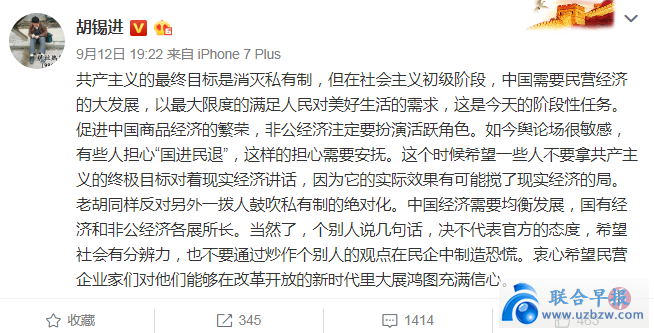
Hu Xijin, editor-in-chief of China’s official media Global Times, posted on Weibo yesterday that the ultimate goal of communism is to eliminate private ownership, but in the primary stage of socialism, China needs a great development of the private economy to satisfy the people’s desire for a better life to the greatest extent.Demand, this is today's phased task.
The following is the full text of the news released by Hu Xijin:
The ultimate goal of communism is to eliminate private ownership, but in the primary stage of socialism, China needs the development of the private economy to maximize the satisfaction of the people's needs for a better life, which is today's phased task.To promote the prosperity of China's commodity economy, the non-public economy is destined to play an active role.
Now the public opinion field is very sensitive, and some people worry that the country will advance and the people will retreat. Such worries need to be appeased.At this time, I hope that some people will not use the ultimate goal of communism to speak to the real economy, because its actual effect may disrupt the real economy.
Lao Hu also opposes the absolutization of private ownership advocated by another group of people.China's economy needs a balanced development, and the state-owned economy and the non-public economy can each develop their strengths.
Of course, a few words from a few people do not represent the official attitude. I hope the society will have discernment, and don't create panic among private enterprises by hyping up the views of individual people.I sincerely hope that private entrepreneurs have full confidence in their ability to make great achievements in the new era of reform and opening up. China Banking and Insurance Regulatory Commission: Preventing and resolving major risks is still the primary task of insurance supervision
The China Banking and Insurance Regulatory Commission recently held the 43rd working meeting of the Solvency Supervision Committee.As of the end of the second quarter of 2018, the average comprehensive solvency adequacy ratio of 176 insurance companies was 246%, a decrease of two percentage points from the end of the previous quarter.The meeting emphasized that preventing and resolving major risks is still the primary task of insurance supervision.
According to the Beijing News, the meeting analyzed and studied the solvency and risk status of the insurance industry in the second quarter of 2018, and reviewed the comprehensive risk rating results of insurance companies in the second quarter and regulatory measures for some companies.The current solvency of the insurance industry is sufficient and stable.
According to the report, specifically, at the end of the second quarter of 2018, the average comprehensive solvency adequacy ratio of the 176 insurance companies included in this meeting was 246%, a decrease of two percentage points from the end of the previous quarter; the average core solvency adequacy ratioIt was 235%, a drop of two percentage points from the end of the previous quarter.Among them, the average comprehensive solvency adequacy ratios of property insurance companies, personal insurance companies, and reinsurance companies were 272%, 240%, and 299%, respectively.After deliberation, 119 insurance companies were rated as Class A companies, 52 were rated as Class B companies, 2 were rated as Class C companies, and 2 were rated as Class D companies in the comprehensive risk rating.
The insurance industry itself is undergoing positive changes, the solvency adequacy ratio remains at a relatively high level within a reasonable range, and both strategic risks and reputational risks are showing positive trends.The current external environment is undergoing major changes, and various external shocks pose severe challenges to the insurance industry.The meeting emphasized that preventing and resolving major risks is still the primary task of insurance supervision. The United States invites China to launch a new round of trade consultations. The Ministry of Foreign Affairs: The invitation has indeed been received and the details are being communicated
The Wall Street Journal of the United States quoted sources as saying on the 12th that US Treasury Secretary Mnuchin has sent an invitation to the Chinese team, hoping that China will send a ministerial-level delegation to conduct trade negotiations with the US before the US government imposes a new round of tariffs on China.The location will be in Beijing or Washington, and the time is in the next few weeks.In this regard, Chinese Foreign Ministry spokesman Geng Shuang confirmed to the media today that China has received an invitation from the US to hold a new round of consultations.
According to a report from the World Wide Web, at the regular press conference of the Ministry of Foreign Affairs of China held this afternoon, some foreign media reporters asked questions about the US invitation to China to hold a new round of consultations on economic and trade issues.Geng Shuang responded: What I can tell you here is that China has indeed received the invitation from the US.
Geng Shuang said that China welcomes this, and said that the two sides are currently in communication on relevant details.He reiterated at the meeting that China always believes that the escalation of trade conflicts is not in the interests of any party.In fact, since China and the U.S. held vice-ministerial-level economic and trade consultations in Washington last month, the economic and trade consultation teams of the two countries have maintained various forms of communication and exchanged views on issues of concern to each other.



